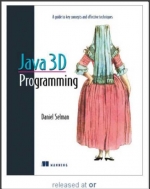Java 3D Programming. Daniel Selman

Категория: Java
Поделиться:
Java 3D is an application programming interface (API) developed at Sun Microsystems for rendering interactive 3D graphics using the Java programming language.Java 3D is a client−side Java API. Other examples of Sun client−side APIs include the Abstract Windows Toolkit (AWT) and Java Foundation Classes (JFC/Swing), which are both Java class libraries for building applications with a Graphical User Interface (GUI).The client−side Java APIs are in contrast to Sun’s server−side APIs such as Enterprise Java−Beans (EJB) and the other components of Java 2 Enterprise Edition (J2EE). Making 3D graphics interactive is a long−standing problem, as evidenced by its long history of algorithms, APIs, and vendors. Sun is not a major player in the 3D graphics domain, although its hardware has long supported interactive 3D rendering.The dominant industry standard for interactive 3D graphics is OpenGL, created by Silicon Graphics (SGI). OpenGL was designed as a cross−platform rendering architecture and is supported by a variety of operating systems, graphics card vendors, and applications.The OpenGL API is written in the C programming language, and hence not directly callable from Java. A number of open source and independent programming efforts have provided simple Java wrappers over the OpenGL API that allow Java programmers to call OpenGL functions, which are then executed in native code that interacts with the rendering hardware. One of the most popular is GL4Java, which you can find at.
Скачать
Комментарии